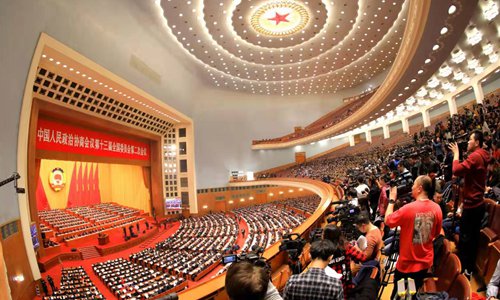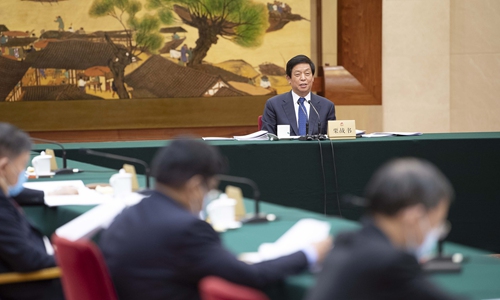
The 13th Chinese People's Political Consultative Conference (CPPCC) National Committee kicks off its annual meeting in March at the Great Hall of the People in Beijing in 2019, marking the start of the year's two sessions - the annual meetings of the CPPCC and the National People's Congress, China's top legislature - the most important annual political event in China. Photo: VCG
The next session of the Standing Committee of the 13th National People's Congress (NPC) will be held in Beijing from April 26 to 29, the first step to the national two sessions, sources said. While Chinese President Xi Jinping's inspection of Wuhan on March 10 signaled the success of the fight against the coronavirus epidemic in the heavily hit province of Hubei, the opening of the "two sessions" indicates China is walking toward normalcy, which are milestone indicators of the country's epidemic battle.
The 17th session of the Standing Committee of the 13th NPC, China's top legislature, will be held in Beijing from April 26 to 29, according to the 50th chairman's session of the Standing Committee of the 13th National People's Congress held by Li Zhanshu, chairman of the Standing Committee of the NPC, on Friday.

Li Zhanshu, chairman of the Standing Committee of the NPC presides the 50th chairman's session of the Standing Committee of the 13th NPC on Friday in Beijing. Photo: Xinhua
On the same day, a meeting of the Standing Committee of the Political Bureau of the CPC Central Committee, chaired by General Secretary of the Communist Party of China (CPC) Central Committee Xi, was also held in Beijing, emphasizing arrangements to implement regular epidemic prevention and control measures and analyzed the current economic situation. The meeting echoed demands for long-term prevention and control work against novel coronavirus pneumonia (COVID-19).
The preparation for this year's "two sessions" is also guided by the key requirements and spirit of the Politburo meeting. While Beijing maintains the same level of emergency response as Hubei to prevent COVID-19, the opening of the most important political event in the capital city of China is seen as meaningful and a recovery from the epidemic, observers said.
It also shows China is rebounding from the epidemic and taking regular preventive measures in fending off a resurgence of infection while accelerating resumption of work.
The openings of the annual sessions of the NPC and the Chinese People's Political Consultative Conference (CPPCC), China's top political advisory body, is usually held on March 5 and March 3, respectively. The postponement of the key events in the country's political calendar this year is widely seen as efforts of top authorities to prioritize the prevention and control work against COVID-19.
Several sources close to the matter told the Global Times that such an arrangement of the Standing Committee of NPC marks a major first step toward an official announcement of this year's national "two sessions" schedule.
The upcoming session has been scheduled to revise drafts on a series of matters including a law on the prevention and control of environmental pollution by solid waste, the administrative punishment of public officials, biosecurity and animal epidemic prevention laws, an amendment to the copyright law, and armed police law.
"Such an arrangement marks the first step toward an official announcement of this year's national two sessions schedule," Luo Yameng, a Beijing-based senior urban management and planning expert, told the Global Times on Friday.
Usually it takes a month to launch the two sessions - the annual meetings of China's top legislative body and top political consultative body - after the Standing Committee of the NPC session is held, Luo noted. "It's highly likely that the two sessions this year will be held in the second half of May or at the beginning of June," he said.
Given the current situation of preventing and controlling epidemic, the decision to hold the "two sessions" in May is a prudent and sound one, an anonymous source close to the matter told the Global Times.
A Hong Kong deputy to the NPC also told the Global Times on Friday that he did not know the exact date of the NPC, but had been informed by a local journalist who was told by Chinese People's Political Consultative Conference (CPPCC) member that the date may fall on May 23.
Against the backdrop of the pandemic, the commencement of local two sessions has a critical meaning for governments that are making comprehensive strategies for the country amid great uncertainties brought about by the pandemic, observers said.
"Holding this year's national two sessions would carry an even more significant message than usual, as it would declare a total victory in the country's battle against COVID-19," Luo said.
Several cities in provinces such as East China's Zhejiang and Southwest China's Sichuan have set dates for their local two sessions. For instance, Wenzhou in Zhejiang recently announced it would hold its local two sessions - the Wenzhou Municipal Committee of the CPPCC and the People's Congress of Wenzhou - on April 21 and 22.
The commencement of local two sessions, like reopening schools, is a manifestation of epidemic control, and it is a critical step to review the government's work from the previous year and hear its plans for the current year, as the whole country has been steadily resuming work and production.
Some deputies to the Beijing People's Congress suggested that the national two sessions could be shortened this year, given the epidemic prevention and control situation.
"Some meetings could be done online, which has become a regular platform for deputies to the People's Congress of Beijing," An Lijuan, a deputy to the People's Congress of Beijing, told the Global Times.
Zhu Zhengfu, a member of the 13th National Committee of the Chinese People's Political Consultative Conference (CPPCC), told the Global Times on Friday that he also supports the idea of using a video conference for the meetings of the national "two sessions," given the epidemic control and prevention situation.
The current technology is more than enough to ensure the transmission quality of the information as well as the security of such transmission, Zhu noted.
An also said she welcomes Xuexiqiangguo, a widely used Party theory learning app, to develop a special two-session version for the online sessions, and compared to other commercial apps, Xuexiqiangguo could provide an extra sense of responsibility to the deputies who represent the public, to raise proposals, and to cast their votes.





